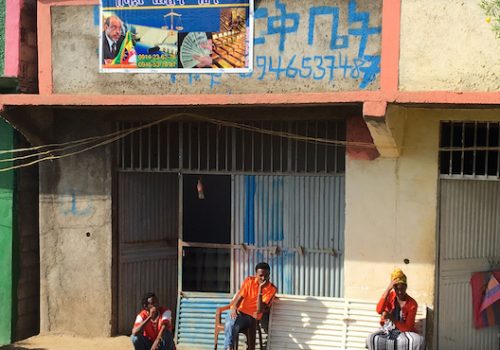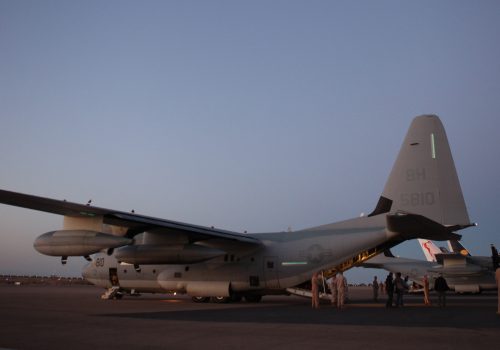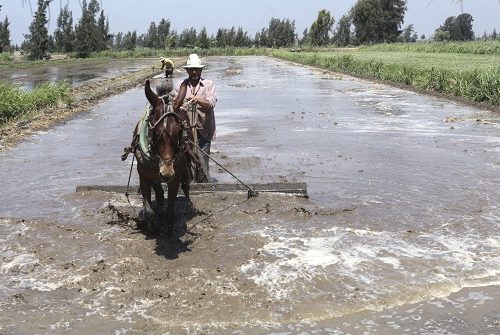Nile Basin’s GERD dispute creates risks for Egypt, Sudan, and beyond
Competition for the Nile Basin’s freshwater has been growing markedly for three decades. In 2011, it intensified after Ethiopia started building the Grand Ethiopian Renaissance Dam (GERD)—a mega-dam reportedly designed to generate electricity—along the upper reaches of the Nile River without prior notification to downstream riparian countries. So far, the project has generated the most intractable challenge yet amongst Egypt, Sudan, and Ethiopia and is, now, the Middle East and North Africa’s most complex and potentially most destabilizing interstate freshwater dispute.
Ethiopia completed the dam during trilateral talks drawn-out since 2011 without compliance with international norms vis-à-vis Egypt and Sudan. Ethiopia eventually rejected binding commitments towards its neighbors in February 2020. In June it declared its intent to fill the dam’s reservoir in July without an agreement in place. This prompted Egypt and Sudan to formally request UN Security Council (UNSC) intervention to forestall significant dangers to international peace and security from such unilateral action.
The GERD’s reservoir has the capacity to hold 88 percent of the mean annual flow of the Nile River, measured at Egypt’s southern border city, Aswan. It is reasonable for Egypt and Sudan, both peoples and governments, to be concerned by this fact alone. But it is not the only troubling issue. The GERD is located where it can dam the Blue Nile just before it leaves Ethiopia, thereby allowing it the infrastructural capability to control most of the Nile River freshwater that flows into Egypt and Sudan. This would affect the lives of over 140 million people in both countries.
Based on its specifications and sensitive location, leading international agencies, such as the Food and Agriculture Organization, UN Development Programme, and World Bank would classify the GERD as high-risk infrastructure. It qualifies for rigorous technical planning and implementation processes—woven around universal human and environmental rights considerations—for all parties the dam will impact, inside and outside the host country. This techno-legal process’ purpose is to protect human security and peace. The process is partly based on international environmental law principles that are precursors to the realization of human rights law. Most of the world’s countries recognize these laws’ interdependence.
The multilateral techno-legal process that should have guided the implementation of the GERD as a transboundary project with multistate human rights and security consequences has been absent. Ethiopia has been developing the GERD without engaging downstream countries in material issues that affect them or allowing them a full, independent evaluation of the GERD through Environmental and Social Impact Assessments (ESIAs). ESIAs are one of the ABCs in applied international environmental law and customary development law, are required by law, and are most useful before a country develops any project that necessitates it.
GERD necessitated transboundary ESIAs and still does. As the affected countries’ legal right, it does not expire, although its usefulness decreases when exercised later than prescribed by law. ESIAs are critical for avoiding or mitigating any significant foreseen harm. Absent ESIAs, harms cannot be fully understood, prepared for, or mitigated. That is why statements like “GERD can, could, may, might” abound in reference to inconclusive, scattered, and speculative estimates about its downstream impacts. Nothing definite, rooted in science, and comprehensive is available; no complete up-to-date information about a host of hydrological, environmental, and engineering concerns and parameters related to GERD have been made accessible in order to permit an independent investigation, as an independent panel of experts reported in 2013.
The GERD’s faulty unilateral development process exposes poor recognition of international law, whose relevant principles are codified in the 1997 United Nations (UN) Convention on the Law of the Non-Navigational Uses of International Watercourses. Its principles have been in use for hundreds of years before they were codified and are universally binding.
Ethiopia also reneged on its pledge in the 2015 Declaration of Principles (DoP), which stipulated that ESIAs would be conducted and used to inform the processes of filling the GERD’s reservoir and operating the dam. The only accomplishment along this two-track pledge has been more of the dam’s construction work; Ethiopia has continued to rapidly build the GERD without the required, orderly multilateral legal process being in place.
Consequently, with necessary knowledge from a transboundary ESIA lacking, Ethiopia was able to circumvent another major legal obligation—making ESIA-informed adjustments in its project to avoid foreseen significant harm to the downstream countries and giving said countries time to prepare for or mitigate unavoidable impacts. Addis Ababa claims that GERD will only create shared transboundary benefits, but this has no factual basis since no transboundary ESIAs have been made. Furthermore, Ethiopian officials have repeatedly declared that the dam is a matter of “sovereignty.” However, the notion of “sovereignty” over a shared natural resource has no place in international freshwater law.
Ethiopia’s government is reneging on other international legal commitments it has made. I have privileged access to at least nine treaties spanning the late 1880s to the present, where Egypt’s Nile freshwater rights are protected. Addis Ababa is a signatory to two of them, once as a monarchy and once as a republic (the DoP aside). Ethiopia abolished its monarchial system in 1975, at which time the country had been a UN member state for 30 years.
Talks the US and World Bank mediated amongst the three riparian countries from November 2019 to February 2020 collapsed before the final meeting, when Addis Ababa rejected a binding agreement with Egypt and Sudan on the filling of the GERD’s reservoir and the dam’s operation. The abandoned agreement had been prepared based on proposals from the Egyptian, Ethiopian, and Sudanese legal and technical teams, with the World Bank’s technical input.
In April, Ethiopia’s Prime Minister Abiy Ahmed abruptly announced that the filling of the reservoir will start by autumn, even without an agreement, which led Egypt to formally complain to the UNSC in May. UN Secretary General António Guterres called for the negotiations’ resumption in accordance with the DoP, which requires completing ESIAs before filling the reservoir and using them as reference for moving forward in compliance with international law. But talks collapsed again shortly after they resumed.
Escalating matters further, in June, Ethiopia’s foreign minister announced that the reservoir’s filling will begin in July. In response, Egypt immediately filed a request for intervention with the UNSC, citing Article 35 of the UN Charter that pertains to threats to international peace and security. In two letters to the UNSC in June, Sudan also voiced its deep concerns about Ethiopia’s rush to fill the reservoir without an agreement, citing very high risks to the lives of millions of Sudanese.
Unlike Egypt and Sudan, Ethiopia is not freshwater poor. River basins extend across 94 percent of its territory, including internal river systems within 28 percent of the country, whereas more than 50 percent of Sudan and 96 percent of Egypt’s territories, respectively, are desert.
Run-of-the-river dams could have provided Ethiopia with energy much sooner than the GERD will and without all the risks it has generated for countries downstream. Moreover, Ethiopia’s already excessive reliance on hydropower is risky due to uncertain climate change projections for rainfall patterns in East Africa. Ethiopia’s abundant solar power provides another alternative for peaceful energy development. Furthermore, if Ethiopia develops its massive unused geothermal resources, it would improve its energy security and alleviate the political strains and military tensions the GERD has created, according to Paul Sullivan, an international energy security expert at the National Defense University.
Ethiopia’s governments have had a troubling history with countries with which it geographically shares rivers and lakes, including Somalia, Kenya, and Sudan. But the GERD crisis sets a dangerous precedent in Africa—home to a quarter of the world’s transboundary rivers, which provide 90 percent of the continent’s freshwater. Africa is also home to most of the world’s poorest countries and two-thirds of the countries of Feed the Future, the US government’s global hunger and food security initiative.
GERD’s unprincipled development process increases risks of transboundary freshwater conflict and border confrontations in a strategic area of the world. Europe and the United States have stakes in a fair resolution to the Nile dispute. Egypt is pivotal not only to the MENA’s stability, but also to international trade. Egypt is an important African trade gateway and provides vital security to the country’s Suez Canal, through which Arab oil to Europe and the US passes. Stability improves Cairo’s ability to reduce illegal cross-border activity between Libya and Somalia and to Asia’s war zones. Sudan is fragile. Aggravating freshwater scarcity could spark local or endo-ethnic tensions and push it over the edge. This could widen turmoil in Africa.
A reliable strategy for peacefully resolving the GERD crisis should be based on incentives for Ethiopia to respect international riparian and development law. This still includes allowing a transboundary ESIA to be conducted, ensuring that intolerable downstream impacts are avoided, permitting time for adjustment plans to be implemented, and comprehensively ending the secrecy and unilateralism that has shrouded the GERD—which is inherently multilateral in its scope and impacts—since its inception.
Amal Kandeel is an Egypt expert and water policy analyst, and the former director of the Climate Change, Environment, and Human Security Program at the Middle East Institute.
Image: Ethiopia's Grand Renaissance Dam is seen as it undergoes construction on the river Nile in Guba Woreda, Benishangul Gumuz Region, Ethiopia, September 26, 2019. REUTERS/Tiksa Negeri/File Photo


